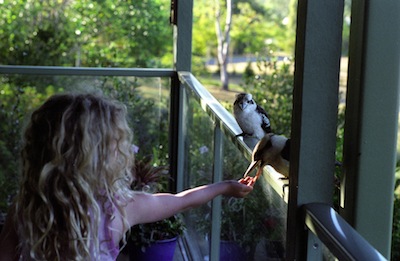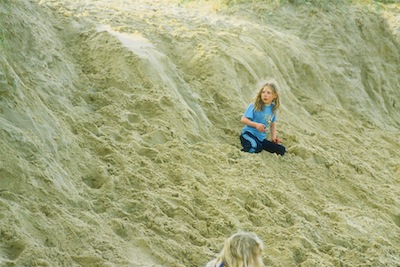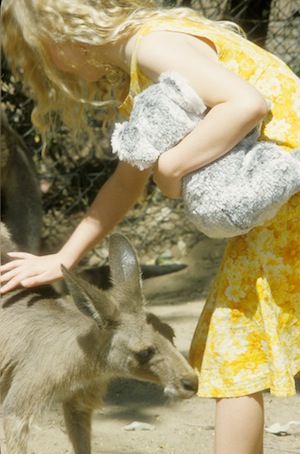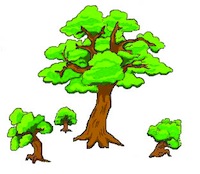School Blinded Me
to Science
by Schuyler Waynforth
Our home and yard are alive with spring at the moment. As I hung the laundry out I could see a great tit, beak filled with wriggling things, preparing to enter his nest to feed the chicks I could hear peeping. At the bottom of our garden, in a rickety, falling down summerhouse, is an aquarium filled with snails that Linnaea and a friend collected from under rocks and bushes and that has been added to at every greenhouse visit. There are sunflower and fennel and giant kale and Big Jim peppers and cornflower and tomatoes and kohlrabi beginning to sprout in the few beds I managed to clear. And in the sunroom, snuggled up in toilet paper in the plant propagator-cum-incubator, is a little chick, which might be a blackbird nestling, whom David rescued from hypothermia as it lay on the cold concrete under the van where the cat left it.
It seems that our lives are filled with moments like this, moments where a hedgehog is found, out in the middle of the day, and is brought home and fattened up to be released so that it can survive the long, lean times of winter.  Or accidentally stumbling onto the life cycle of Perilitus coccinellae, a parasitoid wasp whose larva I discovered cocooned to a ladybug Linnaea had collected to try and cut down on the aphids that were attacking the catnip. We later stumbled across the wasp in its adult guise at the local skate park as they flew into our hair and eyes in a mating frenzy. Or spending hours watching and looking up the wildlife in the rainforest around Springbrook, Queensland, seeing Red-necked pademelons and land mullets (giant, black skinks) and brush turkeys and Crimson rosellas.
Or accidentally stumbling onto the life cycle of Perilitus coccinellae, a parasitoid wasp whose larva I discovered cocooned to a ladybug Linnaea had collected to try and cut down on the aphids that were attacking the catnip. We later stumbled across the wasp in its adult guise at the local skate park as they flew into our hair and eyes in a mating frenzy. Or spending hours watching and looking up the wildlife in the rainforest around Springbrook, Queensland, seeing Red-necked pademelons and land mullets (giant, black skinks) and brush turkeys and Crimson rosellas.
My step-brother-in-law once said to my mom that he thought science was one of those things that must be taught in school. He felt it needed to be taught by those people who have been trained to teach it, that it requires chemistry sets and microscopes and formulae and hypotheses and paper and pencils and workbooks and textbooks. To him science doesn’t seem to be something incidental. But science is incidental; it is everywhere. And it is less about the tools available and more about your approach, your ability to question and explore the workings of the world in which you live.
School is exceptional at taking science away from the individual and placing it, carefully, in a locked box and putting it up on a pedestal with the label: a systematically derived body of knowledge. Among the many problems with such treatment is that science isn’t a body of knowledge. It is a body of systematically derived theories and hypotheses that are tested and testable and changeable. I can remember sitting in my general science class at Kearney Junior High School, doing experiments with the hypotheses written on the board for us to copy down. We weren’t exploring; we were repeating experiments that thousands of students had done before and thousands would do after us. Things like getting aluminum powder to burn when exposed to higher concentrations of oxygen. All I remember of my high school chemistry class is never being able to memorize the Periodic Table, and trying to write out formulas like Al + O2 = Al2O3 which left chemistry feeling like chemical accountancy and not the “central science” connecting the material with the biological. 
In the glass fronted bookcase that was in my grandfather’s law firm and now stands in our living room are my father-in-law’s Newnes’ Pictorial Knowledge: An Educational Treasury and Children’s Dictionary encyclopedic set that he was given in the early 1940’s and that now smell of damp basements upon opening. I find them a fascinating record of how debatable knowledge, scientific or otherwise, can be and has been. There are the expected errors like the mention of the Brontosaurus in the section on dinosaurs, which ends with an almost moral take on how dinosaurs died out due to becoming larger, more unwieldy and “more soft.” And in a section about primates it says, “In its native home the young gorilla lives in the trees, springing easily from branch to branch. At night time the father gorilla keeps guard over his family. They sleep in the tree-tops, but he stands down below, ready to attack if any danger approaches.” As well as having this caption under a photograph of a young orangutan: “It is an odd fact that the young of the great apes are quite intelligent. This baby orangutan was most amusing and affectionate. But after about two years the skull closes down and the whole nature of the animal changes for the worse.” Clearly the Pictorial Knowledge editors’ understanding of the natural world predates both Dian Fossey’s life and death spent with gorillas and Biruté Galdikas' years studying and working to conserve orangutans.
This morning, as I was moving Linnaea’s large collection of snails from their aquarium home into a bucket so I could clean out the rotting vegetation, my step-brother-in-law’s words whispered in my head. There were two snails mating in the aquarium and as I peered at them, in this intimate, hermaphroditic moment, I thought about how much more I know of the world having spent the last 10 years looking at it with a child in my life. I know, for example, that snail mating is a fascinating thing because Linnaea’s love of snails led me there. The partners play both male and female roles, giving and receiving equally. And, they dart each other with calcified harpoons that secrete a chemical that increases the survival rate of their sperm in their partner’s reproductive tract. And while we do have chemistry sets and microscopes and paper and pencils and textbooks scattered in and amongst other books, it is largely that sense that life is better for exploring it, that the best part of moving a paving stone is finding an ant’s nest underneath and watching them work furiously to move the eggs and the babies to a safer place, that has enhanced my understanding of the world.
 While science may build on past information, first and foremost it is an exploration of the world around us and the processes that make up that world. If science were facts writ in stone, Fantasia’s "The Age of Dinosaurs" would be as accurate an understanding of the great extinction of the dinosaurs today as it was when it was made. And if we limit our understanding and our children’s experience of science to that locked box on the pedestal, then their understanding of the world will be as musty and water-stained as the hand-me-down Pictorial Knowledge books have become.
While science may build on past information, first and foremost it is an exploration of the world around us and the processes that make up that world. If science were facts writ in stone, Fantasia’s "The Age of Dinosaurs" would be as accurate an understanding of the great extinction of the dinosaurs today as it was when it was made. And if we limit our understanding and our children’s experience of science to that locked box on the pedestal, then their understanding of the world will be as musty and water-stained as the hand-me-down Pictorial Knowledge books have become.
I have a book, Curious Minds: How a Child Becomes a Scientist, which is a series of essays by scientists about how they became scientists. In a quick scan through them all, only one writes of being inspired by a school assignment, and that was through lateral thinking on the writer’s part, not through the inspiration of the assignment to graph the swinging of a pendulum as the arc changed when the line to which it was attached was shortened. Overwhelmingly they all seem to suggest a life filled with exploration and curiosity. And while I have no sense that my children will make their livelihoods as scientists, I know that their lives will be informed by their curiosity, their desire to explore and know the world. And by their experiences of exploring the world they live in, from our backyard here to wherever their hearts and minds take them.
Schuyler Waynforth lives joyfully in the wilds of East Anglia having returned to the backwaters from which her ancestors came in the early 1600's. She knows far more about the local fauna by rescuing the creatures from the cat's mouth and which end up in either the aquarium, the rabbit hutch, or the plant propagator at the insistence of either Simon or Linnaea, and occasionally who get buried down at the bottom of the garden. Linnaea does sing a lovely dirge.
This appeared originally in an online ezine called Connections, Issue 7, June 2007.
More of Schuyler

Science

Your House as a Museum

 Or accidentally stumbling onto the life cycle of Perilitus coccinellae, a parasitoid wasp whose larva I discovered cocooned to a ladybug Linnaea had collected to try and cut down on the aphids that were attacking the catnip. We later stumbled across the wasp in its adult guise at the local skate park as they flew into our hair and eyes in a mating frenzy. Or spending hours watching and looking up the wildlife in the rainforest around Springbrook, Queensland, seeing Red-necked pademelons and land mullets (giant, black skinks) and brush turkeys and Crimson rosellas.
Or accidentally stumbling onto the life cycle of Perilitus coccinellae, a parasitoid wasp whose larva I discovered cocooned to a ladybug Linnaea had collected to try and cut down on the aphids that were attacking the catnip. We later stumbled across the wasp in its adult guise at the local skate park as they flew into our hair and eyes in a mating frenzy. Or spending hours watching and looking up the wildlife in the rainforest around Springbrook, Queensland, seeing Red-necked pademelons and land mullets (giant, black skinks) and brush turkeys and Crimson rosellas.
 While science may build on past information, first and foremost it is an exploration of the world around us and the processes that make up that world. If science were facts writ in stone, Fantasia’s "The Age of Dinosaurs" would be as accurate an understanding of the great extinction of the dinosaurs today as it was when it was made. And if we limit our understanding and our children’s experience of science to that locked box on the pedestal, then their understanding of the world will be as musty and water-stained as the hand-me-down Pictorial Knowledge books have become.
While science may build on past information, first and foremost it is an exploration of the world around us and the processes that make up that world. If science were facts writ in stone, Fantasia’s "The Age of Dinosaurs" would be as accurate an understanding of the great extinction of the dinosaurs today as it was when it was made. And if we limit our understanding and our children’s experience of science to that locked box on the pedestal, then their understanding of the world will be as musty and water-stained as the hand-me-down Pictorial Knowledge books have become. 